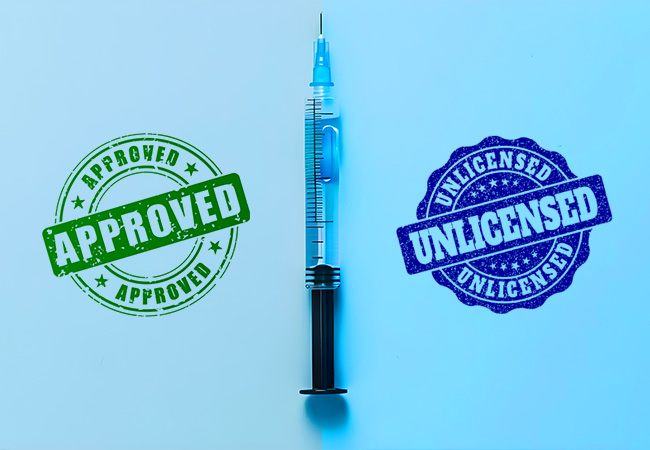When it comes to medical treatments, the terms “licensed medicines” and “unlicensed medicines” often arise, raising questions about their safety, efficacy, and legality. Understanding the difference between licensed medicines and unlicensed medicines is very important, especially when considering off-label or unlicensed medicine usage.
What Are Licensed Medicines?
Licensed medicines have been approved by regulatory authorities for specific uses. In India, the Central Drugs Standard Control Organization (CDSCO) oversees the approval process. A licensed medicine undergoes extensive clinical trials to ensure its safety, efficacy, and quality before receiving approval.
These medicines are labeled with precise information about their indications, dosage, potential side effects, and storage conditions. Healthcare providers prescribe licensed medicines with confidence as they have been rigorously tested and proven effective for specific medical conditions.
What Are Unlicensed Medicines?
Unlicensed medicines, on the other hand, are those that have not been approved for a particular country or specific indication. However, they might still be approved in other regions or used globally. For example, certain rare disease treatments might not have local approval but are accessible through Named Patient Programs or other legal import mechanisms.
Off-label use of licensed medicines also falls under this category. This happens when a doctor prescribes a medication for a condition or patient group not explicitly mentioned in its license, based on clinical evidence or necessity.
Is It Safe to Use Off-Label or Unlicensed Medicines?
Use of off-label or unlicensed medicines can be safe and effective, but it requires careful consideration and guidance:
- Doctor’s Expertise: Decisions to use unlicensed or off-label medicines are typically made by experienced healthcare providers (HCPs) who weigh the risks and benefits for the patient.
- Clinical Evidence: In many cases, off-label or unlicensed use is supported by robust clinical data or is a standard practice in certain medical scenarios.
- Patient-Specific Needs: For rare diseases or unique conditions, unlicensed medicines may be the only available option, making their use essential despite the lack of local licensing.
- Regulated Access: Medicines accessed through legal import mechanisms or specialized programs are subjected to stringent quality checks, ensuring safety and authenticity.
Risks of Using Unlicensed Medicines:
While they can be beneficial, unlicensed medicines may carry some risks:
- Lack of Local Data: These medicines might not have undergone trials specific to the local population.
- Limited Information: Off-label use might not have comprehensive dosage or safety guidelines.
- Dependence on Trusted Sources: Procuring unlicensed medicines from unreliable sources can lead to counterfeit or substandard products.
When Are Unlicensed Medicines Necessary?
Unlicensed medicines are often indispensable in cases such as:
- Rare or orphan diseases with no approved local treatments.
- Conditions where all licensed options have failed.
- Emergency medical situations where timely access to treatment is critical.
How to Safely Access Unlicensed Medicines?
If unlicensed or off-label medicines are necessary, always follow these steps:
- Consult a Specialist: Ensure the decision is made by a qualified doctor.
- Choose Reliable Sources: Work with trusted organizations like the Indian Pharma Network (IPN), which specializes in facilitating the legal supply of unlicensed medicines.
- Understand the Risks and Benefits: Discuss potential side effects and outcomes with your healthcare provider.
Important Considerations for Patients:
The use of off-label or unlicensed medicines can be a safe and effective option when prescribed by an experienced healthcare professional. While there are risks involved, these can be minimized by ensuring the medicine is sourced through reliable and legal channels. For those facing unique medical challenges, such treatments often offer hope and a path toward improved health.
If you are looking to buy unlicensed medicines, reach out to trusted suppliers like the Indian Pharma Network (IPN). We ensure safe and legal access to the treatments you need.
Can I buy unlicensed medicines online in India?
Yes, unlicensed medicines can be legally procured online in India through a Named Patient Program or similar regulatory frameworks. Trusted unlicensed medicines supplies, such as the Indian Pharma Network (IPN), help patients access these medicines through authorized and legal channels. We ensure the medicines are genuine and sourced from globally trusted suppliers.
Who is a trusted supplier of unlicensed medicines in India?
The Indian Pharma Network (IPN) is a trusted and reliable supplier of unlicensed medicines in India. IPN specializes in helping patients and healthcare providers access advanced therapies and rare medications that are not yet approved locally. We have years of experience in facilitating the safe and timely delivery of life-saving treatments.
Where can you buy unlicensed medicines in India?
You can buy unlicensed medicines in India through reputable providers like the Indian Pharma Network (IPN). We assist patients in legally importing unlicensed medicines for personal use, ensuring compliance with Indian regulatory requirements. Kindly Call/WhatsApp at +91 9310090915 or dial our TOLL-FREE: 1800-889-1064.
Who provides unlicensed medicines in India?
The Indian Pharma Network (IPN) is a leading provider of unlicensed medicines in India. We work with licensed global suppliers to procure high-quality and authenticated medicines for patients in need. IPN also assists in managing the regulatory paperwork required for import.
How does the Indian Pharma Network (IPN) help with unlicensed medicines?
We supports patients by facilitating the legal import of unlicensed medicines. We handle the necessary documentation, source the medicines from authorized global suppliers, and ensure timely delivery. IPN is committed to making advanced treatments accessible to Indian patients safely and reliably.






